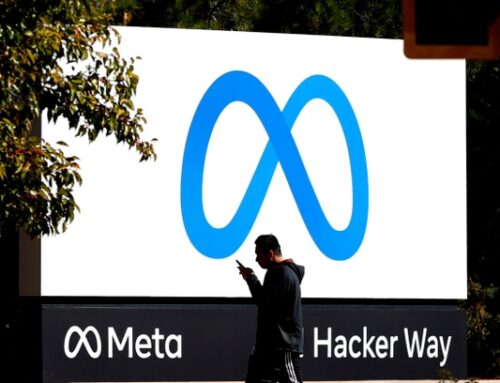Will Big Tech earnings pop the AI bubble?
October 28, 2025

This week, the world’s most powerful firms, Microsoft, Meta, Alphabet, Amazon and Apple, will announce their quarterly results, which could either propel Wall Street to new highs or puncture the AI so-called ‘bubble’.
Together, these five firms make up a quarter of the S&P 500’s value, and have collectively added over $6tr (£4.5tr) to their market cap since ChatGPT ignited the AI boom in November 2022.
But as they prepare to reveal another round of earnings, investors and analysts will be watching closely to see if the AI mania has indeed gone too far.
Is the AI gold rush still glittering?
According to London Stock Exchange (LSEG) data, Alphabet, Amazon, Microsoft and Meta are all expected to report strong revenue growth from the July to September quarter, ranging from 12 to 22 per cent.
Yet, behind these top lines lies a more complicated story.
The so-called ‘Magnificent Seven’ have spent eye-watering amounts – a total combined £400bn this year alone – on data centres, chips and cloud infrastructure to power generative AI.
Next year, analysts expect that figure to run up towards the $550bn mark, according to Morgan Stanley.
However, returns remain uncertain, with a widely cited MIT study earlier this year finding that just five per cent of corporate AI projects deliver measurable gains.
“The industry is trying to pretend this is amazing, and it’s not”, admitted OpenAI co-founder Andrej Karpathy.
Still, markets have continued to reward Big Tech’s conviction, time and time again. “As long as we don’t see cracks in the AI capex story or the monetisation outlook, the rally could continue”, said David Lefkowitz, head of US equities at UBS Global Wealth Management.
Microsoft: the market’s benchmark
Of the pack, Microsoft remains the Big Tech benchmark for AI execution, with its deep partnership with OpenAI embedding ‘Copilot’ tools across its suite, driving new revenue streams.
“Microsoft is the best-positioned ‘AI utility’ in the market”, said Lale Akoner, global market analyst at eToro.
“But heavy capital expenditure tied to AI infrastructure could weigh on margins in the short term.”
Analysts expect Azure cloud revenue to reach up to 38 per cent, outpacing both Google Cloud and Amazon Web Services (AWS).
But with capex projected to jump 42 per cent to $91bn this year alone, its chief financial officer Amy Hood faces pressure to show that growth can keep pace with spending.
Alphabet: Google search in the spotlight
Meanwhile, Alphabet’s results are expected to show solid gains from digital advertising and cloud services.
Yet, the spotlight will fall on its biggest gamble yet, integrating AI directly into Google Search.
“The company is walking a fine line between innovation and disruption”, said Akoner. “AI-generated answers could temporarily weigh on ad revenue before unlocking new monetisation opportunities.”
Alphabet’s capex has already swelled to $85bn in the last twelve months, with analysts forecasting an uptick to up to $92bn in 2026.
Chief financial officer Anat Ashkenazi has insisted that spending is disciplined and demand-driven, but investors will no doubt want proof that the AI-driven future doesn’t eat into today’s profits.
Meta: buoyed by AI tools
Over at Meta, strong ad growth and soaring engagement on the social media platform Instagram have kept the firm’s turnaround story afloat.
“Meta has been riding a wave of advertising growth, helped by smarter AI tools”, Akoner argued. “Investors will be watching whether it can sustain double-digit growth and deliver upbeat holiday guidance.”
However, the metaverse and AI infrastructure remain cash-hungry.
Meta’s capex could hit $69bn this year, up more than 80 per cent. “Efficiency” seems to remain the buzzword, but cost discipline will be tested as both regulatory and competitive pressures mount.
Amazon and Apple: Big stake ‘outsiders’
Amazon’s AWS unit remains the cloud market’s largest player but trails rivals in AI momentum.
Chief executive Andy Jassy said the group will “invest more capital in chips, data centres and power”, more than $100bn this year, to chase the “unusually large opportunity” in generative AI.
Meanwhile, Apple, perhaps the least AI-exposed of the tech giants, is expected to ramp up its investments.
Chief executive Tim Cook has promised “significant growth” in AI-related capex, which remains just a fraction of peers at $12bn. Investors will listen closely for hints of an AI strategy that extends beyond iPhone sales and demand.
The AI bubble debate
The ever-growing web of circular deals between AI behemoths, ranging from Nvidia’s reported $100bn investment in OpenAI to Meta’s $27bn private-credit financing for data centres, has prompted warnings of “systemic risk” reminiscent of the dotcom era.
“When the same companies are funding and relying on each other, decisions may no longer be based on real demand”, argued Ahmed Banafa, engineering professor at San Jose State University.
Despite this, some believe fears of an AI bubble are overstated. “Adoption may be low right now, but that’s not a forward indicator”, said Eric Schiffer, Patriarch Organisation boss. “With greater spend and innovation, adoption will grow. I don’t think we’re at a bubble stage yet.”
With tech earnings coinciding with an anticipated US interest rate cut, the stakes have reached new highs.
A cooler inflation report last week lifted stocks to record highs, but analysts warn the rally is fragile and increasingly dependent on AI optimism.
“This week could determine whether the rally continues, or if it takes a pause”, said Talley Leger, chief market strategist at Wealth Consulting Group.
So far, 85 per cent of S&P 500 companies have beaten earnings estimates – the strongest showing in four years. But sustaining those gains will require Big Tech to convince investors that the AI revolution isn’t just hype, but hard profit.
Search
RECENT PRESS RELEASES
Related Post


